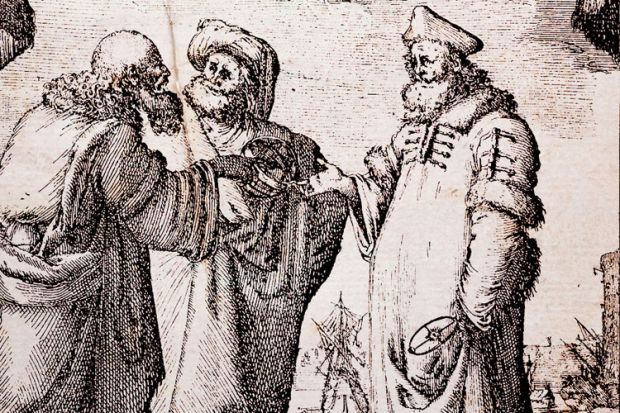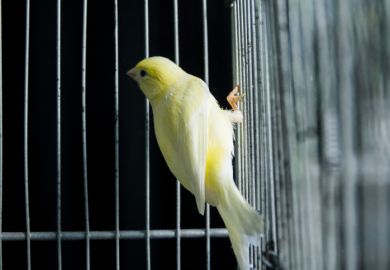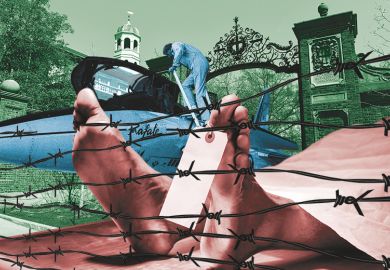I noticed some upside-down jottings on the back of the last page of the Cicognini manuscript. And then a name jumped out at me: ‘Galileo’
I am currently the fortunate, and extremely grateful, recipient of a Leverhulme research fellowship that has given me three years’ relief from teaching and administrative responsibilities to pursue a research project on the origins of opera. As part of my award, the Leverhulme Trust has also granted me a generous allowance for travel costs to study research materials in Italy, which is why I am writing this from Florence. For Florence, not content with being the birthplace of Dante and therefore modern Western literature (as Erich Auerbach and Edward Said agreed), of modern painting, sculpture and architecture, and arguably, with Galileo, of modern science too, was also the cradle of modern Western music, whose principles developed out of the first operas, which were presented in Florence around 1600.
Italy’s Biblioteca Nazionale is dispersed across a number of cities, but the two “central” libraries are in Rome and Florence. The Florence library is a lowering Beaux Arts building overlooking the Arno in the Santa Croce district of the city; its riverside location meant that it suffered appalling losses in the 1966 floods, and much of the collection is still being restored almost 50 years later.
The imposing entrance is presided over by huge statues of Dante and Galileo. Inside, the library is a succession of somewhat gloomy spaces clad in the grey stone known as pietra serena, whose use is so distinctive to Tuscan architecture, and lit by industrial-scale strip- and floodlighting. Unused areas populated with empty display cases and denuded Formica pedestals are roped off with striped red and white barrier tape. It took me a week before I worked out how to get all my books delivered to the old books reading room, or sala consultazione, with its views across the Arno to the Tuscan hills beyond, rather than to the main reading room, a cavernous top-lit space whose marble floors amplify every cough and rustle of the fidgety students and secret biscuit munchers who congregate there.
The library has an impressive security system that involves a good deal of card swiping. On entry your card is scanned and you are given a locker key. You can’t leave the building without returning the key, and you can’t return the key if a scan of your card shows that you haven’t returned all your books. There is no cafeteria in the building, just some vending machines in a scuzzy basement area by the toilets, but you can’t leave your books on your desk, or your laptop in the locker, to pop out for a quick coffee or lunchtime sandwich. All books must be returned to the issue desk – a 100m march (I paced it) from the only room with a sufficiently strong wi-fi signal though the enfilade of reading rooms that runs the full length of the building. Reserving the books entails another routine of form-filling, and then one has to pack up one’s gear, empty one’s locker and return the key to be allowed out of the building, the whole process being repeated in reverse on re-entry.
Not content with this, the library also requires you to hand over your passport every time you look at a rare book or manuscript – although this would not have prevented one of the most egregious recent examples of book theft in Italy. The venerable Girolamini Library in Naples, where Vico worked, was closed when I was there in 2013 because its erstwhile director, a onetime Berlusconi associate with a fake aristocratic title and equally fake academic credentials, had been charged with – and was subsequently found guilty of – stealing thousands of volumes from the library, selling them on the antiquarian books market (or gifting them to other more prominent Berlusconi associates) and replacing some of the most important, such as a copy of Galileo’s Sidereus Nuncius, with high-quality forgeries.
The security system in the Biblioteca Nazionale in Naples, which I succeeded in accessing on the same visit last year, was similar to that in Florence – except that it is not automated. Instead, one has to fill in request forms for books manually, in triplicate (and no, not using carbon copies like the old British Library request forms; each part of the form has to be filled in separately) in the catalogue room before entering the library proper. Here you hand over your passport and the first copy of each of the request slips to the Cerberus, who then gives you a locker key. To leave (and to retrieve your passport) you have to show the stamped second copy of each slip that proves that you have returned your books, which the guardian matches up against the slips in his possession.

The Naples library is housed in the vast former royal palace. The grand main reading room has a sumptuous baroque ceiling, whose preservation cannot be helped by the fact that the man behind the issue desk smokes a constant chain of cigarettes. But for some reason, the theatre collection is housed in a different part of the building, involving a 10-minute hike through a succession of palatial rooms filled with the kind of old-fashioned office furniture that you see on the pavement along the Old Kent Road, then up a rickety servants’ staircase or in an even more rickety lift, and along passages lined with glassed-in cubbyholes where mysterious functionaries sit reading libri gialli and photo-novels, or playing with their smartphones; no doubt the nephews and aunts of people who were owed a favour for something somewhere. When you finally reach the theatre reading room (for which you have to ring a bell for admission) it’s worth the trek, for the room has a spectacular view over the Bay of Naples. But the first time I worked there I made the mistake of thinking I could leave the library to get a sandwich without returning my books. Having navigated the 10-minute journey to the exit, I was sent back to collect my slips.
My apartment in Florence is a mere five minutes from the library. Just as well, because it took me a while to get the library system here embedded as routine. In London I live a 10-minute cycle ride from the British Library, and my routine for that library (check: card, pencil, glasses, £1 coin for the locker…) is now second nature. But a number of times I’ve had to return to my apartment here in Florence because I’ve forgotten a vital item. This, I realise, is the oddly discombobulating difference between working somewhere that one usually thinks of as a holiday destination and actually being on holiday, which is all about freeing oneself of routines.
To ensure that I don’t forget that I’m in Florence to work and not to play I have established another of my home routines – regular visits to a gym. Six years ago I keeled over with an entirely unforeseen heart attack (unforeseen because I was a slim, non-smoking cyclist with no known heart problems who had only recently turned 50). I took seriously the strict exhortations we received during the rehab programme to do at least 30 minutes of hard exercise five times a week and joined a gym forthwith. (Be warned: urban cycling counts as “activity”, not exercise.) Going on holiday is about not having to go to the hateful gym, so I have, in a puritanical way, signed up to a nearby gym here. And, of course, the new gym demands learning new routines, too. In London I have a library bag and a gym bag. But in Florence one bag has to do duty for both, resulting in at least two occasions when I have presented my library card at the gym and turned up at the library with a pair of whiffy trainers in my bag.
Although most of my time has been spent in the Biblioteca Nazionale, where I am now greeted as a regular, there are three other important libraries in Florence: the Biblioteca Marucelliana, the Biblioteca Riccardiana (in the Medici-Riccardi Palace), and the Laurentian Library, designed by one Michelangelo. Since the Laurentian Library is a tourist attraction, scholars unfortunately don’t get to sit in Michelangelo’s reading room, or even go up his weirdly molten staircase; instead we are sent round the back, where there is a cosy but less impressive room for study.
Each of these libraries has its own bureaucratic procedures, and there’s a good deal of eyebrow raising if you can’t remember the particular procedure for the library you are in that day. The Biblioteca Medicea Laurenziana (to give it its proper name) and the Riccardiana hold important collections of manuscripts, which were the reason for my visiting them. Despite having translated a book from Italian, I’m not a 16th-century Italianist, nor am I trained in archival palaeography, so I often struggle to decipher the minutes of a 16th-century Florentine academy or the correspondence of a literary scholar. Minute-takers use abbreviations, and since paper was expensive, often so did letter writers, which can make reading a manuscript like deciphering the Da Vinci code. But there is a fetishy thrill in having an original manuscript in your hand. In the state archives in Mantua last year I asked to see the letters of Claudio Monteverdi, one of the most important series of documents in the history of Western music. The letters have been published in Italian, and in English translation, and there was no real need for me to see them in the flesh (as it were). Indeed, I expected that they might be inaccessible, kept in a temperature-controlled display case somewhere. But no eyebrows were raised at my request, and a few minutes later a standard-issue box file was unceremoniously plonked on my desk, with the letters loose inside. It’s just as well that they have been transcribed, since they are well-nigh illegible, but no historian can surely resist the aura of such objects.

Even so, one soon learns the standard abbreviations for salutations, titles and the like in such documents, and since I’m now steeped in 16th-century debates about Aristotle’s Poetics, it doesn’t take so long to realise that in a sentence about the goal of tragedy “m + squiggle e p + squiggle” represents misericordia e paura – Aristotle’s “pity and terror” (although these are sometimes rendered as pietà e terrore, or pietà e spavento, just to confuse things).
Context is all – as I discovered when I had contrasting experiences of attending two live events here. The first was at the British Institute, where the director of the Etruscan museum in Cortona gave a talk, in Italian, about an exhibition of Etruscan antiquities collected in the 18th century by Thomas Coke of Holkham Hall in Norfolk (who attentive readers of Times Higher Education will remember has made an appearance in one of my previous contributions to this journal). Hand on heart I can say that I followed 90 per cent of the talk. The following night I went to the Teatro Puccini, a striking Fascist-era cinema-turned-theatre in a Florence suburb, where the well-known Florentine comedian Paolo Hendel did a solo show that included his hugely popular caricature of a Berlusconi-like politician. I understood no more than 10 per cent, and that 10 per cent never enough to get even one of the punchlines that were arousing those around me to such gales of laughter.
As my stay draws to its end, I pray to the deities of the research excellence framework that I have made the best of my precious time in Florence. The most astonishing thing about undertaking any kind of historical research project in Britain is realising quite how comprehensive the British Library’s collection is. I estimate that 90 per cent of the research materials I have needed are sitting there: obscure 16th-century Italian courtesy manuals and treatises on horse training; the rarest madrigal collections; richly illustrated editions of Ovid; never-performed academic tragedies or courtly pastorals – all are to be found in the British Library’s collections.
Consequently, I could whittle down what I could look at only in Florence to manageable proportions. Manuscripts, of course, are unique. But now the explosion of document digitalisation – new resources appear daily on sites such as Internet Archive and Google Books, or on library and archive websites – means that before very long there may be no call to visit libraries and archives to view even manuscripts. I was struggling with the correspondence of an early 17th-century Italian scholar in the Riccardiana one morning, painstakingly transcribing his thoughts on Greek prosody, when a random Google search to check a reference in the text revealed that the whole correspondence had already been transcribed and was now available online. I could have sworn that I’d checked before, and was almost disappointed to have to lay aside my labours.
Nonetheless, there are things that a scanned document on Google Books may not reveal. One of the avenues of my enquiry is the relation between early opera and early modern science, prompted by what I believe to be a reference to scientific enquiry in a chorus of Monteverdi’s L’Orfeo of 1607. Looking at the manuscript for the libretto for Andromeda, a musical drama presented in Florence in 1618 by Jacopo Cicognini, an important figure in the literary and theatrical world of early 17th-century Florence, I noticed some upside-down jottings on the back of the last page of the manuscript. Turning the page right-side up, it was evident that the scribbles were the result of Cicognini testing a new pen. But there were also some more carefully written words, in the fancy humanist script used by Cicognini for headings: “Dic [next line] ichiarsi”; “per la pre [next line] m”; “mancando”; “mandano” “alcuno della [next line] sua natura”. And then a name jumped out at me: “Galileo”.
The placing of Galileo’s name in relation to some of the other phrases allows a possible reading of “Dichiararsi Galileo per la prem…” (Galileo declares himself for the prize/to be the pre[eminent…]). Although a number of people have looked at this manuscript, no one has commented upon (or perhaps even noticed) this startling reference. In fact, Cicognini’s interest in his fellow Florentine Galileo is known from another of his music dramas, L’amor pudico, presented at a wedding in Rome in 1614, which contains a scene set in heaven with a chorus of “Medicean stars” – the satellites of Jupiter whose discovery with his new telescope had been announced by Galileo in Sidereus Nuncius four years previously. (Incidentally, the Galileo scholar Mario Biagioli was unable to locate a copy of L’amor pudico for his 1993 study of Galileo; he’d now find it online.) Cicognini also penned an ode for an edition of Galileo’s Dialogue Concerning the Two Chief World Systems, the text that earned Galileo condemnation by the Church. The discovery of this reference to Galileo in the manuscript for Cicognini’s music drama is for me further testament to the intertwining of opera and science at this time. Would someone making a digital scan of a document like this notice some upside-down jottings at the back of the manuscript, or think to copy them?
Register to continue
Why register?
- Registration is free and only takes a moment
- Once registered, you can read 3 articles a month
- Sign up for our newsletter
Subscribe
Or subscribe for unlimited access to:
- Unlimited access to news, views, insights & reviews
- Digital editions
- Digital access to THE’s university and college rankings analysis
Already registered or a current subscriber? Login





